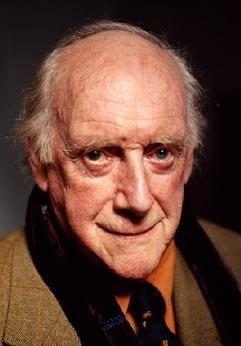Graham Crowden (Clement Graham Crowden)

Crowden was born in Edinburgh, the son of Anne Margaret (née Paterson) and Harry Graham Crowden. He was educated at Clifton Hall School and the Edinburgh Academy before serving briefly in the Royal Scots Youth Battalion of the army until he was injured in a bizarre accident. During arms drill he was shot by his platoon sergeant, when the sergeant’s rifle discharged. The sergeant reportedly enquired “What is it now, Crowden?”, to which Crowden replied “I think you’ve shot me, sergeant.” He later found work in a tannery. Crowden had a long and distinguished theatrical career, most notably at Laurence Olivier’s National Theatre where he performed as The Player King in Rosencrantz and Guildenstern Are Dead, the play by Tom Stoppard. He occasionally played mad scientists in film, taking the role of Doctor Millar in the Mick Travis films of director Lindsay Anderson, O Lucky Man! (1973) and Britannia Hospital (1982) and also playing the sinister Doctor Smiles in the film of Michael Moorcock’s first Jerry Cornelius novel, The Final Programme (1973). He also played the eccentric History master in Anderson’s if…. (1968). In 1970, he appeared in the popular Thames Television series Callan as The Groper, a de-registered doctor, who had been in Wormwood Scrubs called on by Callan, when unofficial medical assistance was required (e.g. Series 3, “A Village Called G” and likely others between 1967–73 though some are now lost). In 1975, he made an appearance in “No Way Out” – an episode of the British sitcom Porridge alongside Ronnie Barker, Brian Wilde, Richard Beckinsale and Fulton Mackay, as the prison doctor when Fletcher was complaining of an injured leg. He was offered the role of the Fourth Doctor in Doctor Who in 1974, when Jon Pertwee left the role but turned it down, informing producer Barry Letts that he was not prepared to commit himself to the series for three years. The role ultimately went to Tom Baker. He appeared in The Horns of Nimon (1979) as a villain opposite Baker. This was the reason why Ian Marter was originally hired, as the producers and directors considered Crowden too old to be seen running about and taking on a larger physical role.
A regular role was in the BBC comedy-drama A Very Peculiar Practice (1986–88) as the alcoholic Dr. Jock McCannon. In 1990, he appeared as a lecherous peer in the BBC comedy Don’t Wait Up and in 1991 he played a modest role in the Rumpole of the Bailey episode “Rumpole and the Quacks”, portraying Sir Hector MacAuliffe, the head of a medical inquest into the potential sexual misconduct on the part of Dr. Ghulam Rahmat (portrayed by Saeed Jaffrey). In 1990, he landed the role of Tom Ballard in the sitcom Waiting for God, opposite Stephanie Cole’s character Diana Trent, as the two rebellious retirement home residents. The show ran for five years and was a major success. In 1994, Crowden played the part of Professor Pollux in the BBC TV adaptation of the John Hadfield novel Love on a Branch Line. Crowden then voiced the role of Mustrum Ridcully in the 1997 animated Cosgrove Hall production of Terry Pratchett’s Soul Music. In 2001, he guest-starred in the Midsomer Murders episode “Ring Out Your Dead” and also played The Marquis of Auld Reekie in The Way We Live Now. Between 2001 and 2002, he played a role in the BBC Radio 4 comedy series The Leopard in Autumn. In 2003, he made a cameo appearance as a sadistic naval school teacher in The Lost Prince. In 2005–08, he starred in the BBC Radio 4 sci-fi comedy Nebulous as Sir Ronald Rolands. In 2008, he appeared as a guest star in Foyle’s War. For many years towards the end of his life, he lived in Mill Hill, London NW7. Crowden died on 19 October 2010 in Edinburgh after a short illness. Crowden is survived by his wife, Phyllida Hewat, whom he married in 1952, a son and three daughters, one of whom, Sarah, followed him into acting.
Born
- November, 30, 1922
- Edinburgh, Scotland
Died
- October, 19, 2010
- Edinburgh, Scotland

